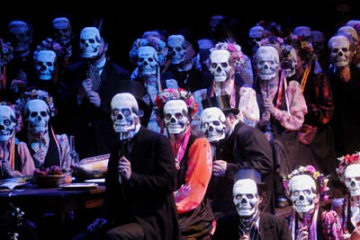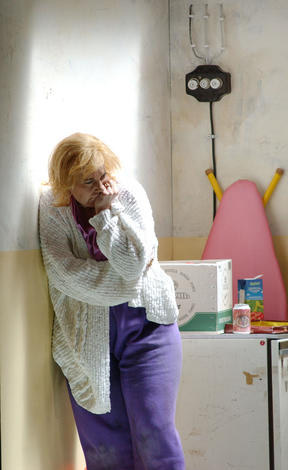|
|
| 
Editorial
Board
North American Editor:
(USA and Canada)
Marc
Bridle
London Editor:
(London UK)
Melanie
Eskenazi
Regional Editor:
(UK regions and Europe)
Bill
Kenny
Webmaster:
Len
Mullenger

|
Seen and Heard International
Opera Review
Shostakovich, Lady
Macbeth of Mtsensk (in German), Soloists, chorus
and orchestra of Hessisches Staatsoper, Staatstheater Wiesbaden,
Conductor: Fabrizio Ventura. Director: Manfred Beilharz.
Sets and costumes: Bernd Holzapfel, 08.07. 2006 (BM)
and
Shostakovich, Lady Macbeth
of Mtsensk: Soloists, chorus and orchestra
of Nationaltheater-Mannheim Conductor:Wolfram Koloseus.
Director: Tilman Knabe. Sets Alfred Peters, costumes:
Kathi Maurer, 09.07. 2006 (BM)

The German Rhein-Main area had a welcome alternative to
offer during this past weekend of World Cup play-offs
and the football establishment's sponsored opera gala
featuring Domingo, Villazon and Netrebko in Berlin. What’s
more, since September 2006 is also the centenary of Shostakovich's
birth it was a refreshing change to the ubiquitous Mozart
celebrations. His opera Lady Macbeth of the Mtsensk
District was performed on July 8th at the
Hessisches Staatstheater in Wiesbaden, while Germany was
playing for 3rd place, and at the Nationaltheater
in Mannheim on July 9th, the night of the final
game.
The work has become famous as a result not only of the
notorious and musically explicit sex scene, but also of
the ominous Pravda article entitled “Chaos instead of
Music”, purportedly written by Stalin himself after attending
a performance at the Bolshoi Theater in Moscow. This had
a near-fatal impact on the composer’s life and career
from then on, steeping him in such despair that he even
contemplated suicide. Nonetheless, he was never to succumb
to the same fate as his “hero” Katerina Ismailova, even
when scores of colleagues spoke out against him and betrayed
him. His friend Isaak Glikman remembers the following
statement made by Shostakovich during the era of Stalinist
cleansing: “Even if they chop off both of my hands, I
shall continue to write music – I will just have to hold
the pencil between my teeth.” But he never composed another
opera.
The excellent production in Wiesbaden opened last year,
realistically directed by Manfred Beilharz (who succeeded
in particular in staging a very effective wedding scene,
during which the guests all of a sudden turn into omens
of death.) A clear-cut set and straightforward costumes
by Bernd Holzapfel, planted the action squarely in 19th
century provincial Russia in keeping with the libretto.
Milana Butaeva in the title role was able to convince
her audience right from the start, thanks to the sheer
volume of her voice and very strong stage presence. Her
soprano did tend to sound a bit harsh in the higher registers,
but this only served to generate compassion for her character,
the passionate murderess, as was Shostakovich’s intention.
The composer himself was the husband of a brilliant nuclear
physicist, who died tragically at a fairly young age (according
to the great pianist Svjatoslav Richter, she was “the
cleverest and most pleasant of his wives”) and to whom
he dedicated his opera. Lady Macbeth shows that
the composer had the courage to criticize the situation
of women in 19th century Russia in this work,
and more significantly to denounce Stalin’s ideal of Soviet
women as selfless mothers.
There were also other singers worthy of mention in the
Wiesbaden cast, especially Dan Chamandy as Serge (dressed
in a macho undershirt ) with his radiant tenor, as well
as some outstanding voices in supporting roles: Sandra
Firrincieli as Sonjetka and Tom Mehnert the Old Prisoner
were also noteworthy. But the best thing about the whole
evening was the theater’s colorful, vibrant chorus (rehearsed
by Thomas Lang) and its orchestra, bursting with gripping
tempi and rhythms and playing spectacularly under Fabrizio
Ventura. Even during the most brutal scenes, the brass
fanfares were never too vociferous, thus allowing the
soloists to make themselves heard at all times, and the
lyrical passages were emphasized to great effect with
a supple string section and exquisite oboe and English
horn solos, in particular during the final act.

The following evening, up and coming director Tilman Knabe’s
version was on the bill in Mannheim. Admittedly, some
of his ideas were ingenious – particularly the camera
lens zooming in on individual scenes and lending a cinematic
touch to the production – but on the whole, his vision
was irritating and pretentious. It all seemed like a bit
of an insult to his audience’s intelligence, since most
of us are probably quite capable of recognizing the meaning
of the violent and often pornophonic passages in this
music, where the composer deliberately avoided sounds
pleasing to the ear, even without this exaggerated number
of “clues” shown on stage. Knabe is quite right when he
says that none of the brutal and raw elements of this
work should be glossed over; but saying that is one thing
and disregarding the text is quite another. It was well-nigh
impossible to feel any empathy whatever for this sex-crazed,
bulimic woman in the midst of a modern-day Russian mafia
environment, making this reading more than just a little
offensive to women. Sadly, no cliché was too annoying
to be included in this production, as became apparent
when Katerina and Sergei 'did it' over the dead body of
her strangled husband, which they had disposed of in a
plastic bag in the cellar – no comment.
Nonetheless, this production does have two great advantages.
First and foremost, a truly superb performance by Jayne
Casselman in the title role. Her bronze-hued, warm soprano
is exquisitely suited not only to the dramatic but also
to the lyrical aspects of her part: and I would even go
as far as to say that she actually demonstrates how lyrical
it really is, even more so than the benchmark-setting
recording by the great Vishnevskaya on EMI. Her colleague
Mihail Mihaylov is also more than admirable as father-in-law
Boris.
Secondly, the opera is sung
in Russian, the language for which Shostakovich once composed
his music, something which is audible in almost every
single phrase – with all due respect to the excellent
German translation by Morgener/Schoenbohm used in Wiesbaden.
Bettina Mara
Pictures: © Hessisches Staatsoper and
National-Theater, Mannheim
Note: Simon Morgan reviewed the Wiesbaden performance
in 2005 HERE
(Regional Editor)
Back to the Top
Back to the Index Page
|
|




